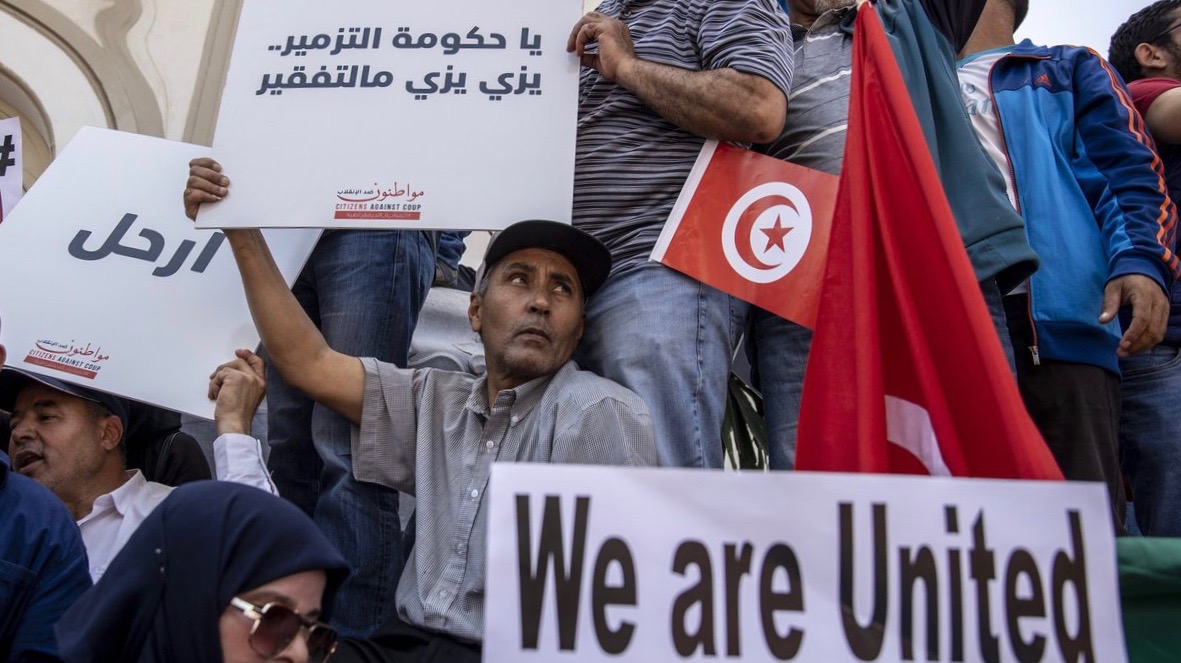The Tunisian General Labour Union (UGTT), the country’s main trade union, decided on Monday, May 23, to boycott the national dialogue announced by President Kais Saied to enact a new constitution in the country. The union instead decided to go on a general strike to “defend workers’ economic and social rights.”
In a statement issued on Monday after a meeting of its administrative committee, the UGTT said that the decision to start the national dialogue taken by the President “is not the result of prior consultation or agreement and does not meet the national aspirations.” It rejected any dialogue “with unilaterally determined roles and excluding political and civil forces,” TAP reported.
Early in May, Saied had announced that a commission will be formed to carry out a national dialogue with the UGTT, Tunisian Confederation of Industry, Trade and Handicraft, (UTICA), Tunisian Human Rights League, and Tunisian Orders for Lawyers. He had also announced that no political parties and civil society groups would be allowed to be part of the consultation for the creation of a new constitution in the country.
On Friday, Saied announced the appointment of the head of the National Dialogue under the National Consultative Commission for a New Republic. The UTICA and two other groups have already announced their participation.
According to decree number 30 of 2022, the commission has 21 days to finish the consultation with the four groups mentioned by the President. After the consultation, the commission will draft a new constitution which will be put up for referendum.
Workers’ Party announces joint left front against Saied’s rule
The political parties in Tunisia have also opposed the unilateral move by Saied. On Monday, Hamma Hammami, head of Tunisia’s Workers Party, announced that his party will not participate in the elections or the referendum based on the national dialogue. In a statement on its Facebook page, the party claimed that Saied’s move will be “laying the foundations of his autocratic rule.” It added that the so-called consultative committee is an attempt to provide legitimacy to Saied’s pro-rich system.
Ennahda and other right-wing political formations in Tunisia formed a National Salvation Front last month to oppose Saied’s moves. The Front includes parties like the Heart of Tunisia and Al-Amal.
The Workers’ Party has decided to create a broad coalition of left parties in the country to lead the opposition against Saied’s “dictatorial orientation” and “fascist and populist rule.” The proposed front will not join hands with religious and bourgeoisie political formations such as Ennahda and the Free Constitutional Party led by Abeer Mousa, said Workers’ Party leader Ammar Amroussia.
Amroussia claimed to have started consultations with other like-minded parties in the country including the Democratic Current, Block for Labour and Freedom, and Socialist party, among others, for the coalition.
Saied was elected President of Tunisia in October 2019. In July 2021, he dismissed Prime Minister Hichem Mechichi and suspended the parliament accusing the government of failing to tackle the country’s economic problems and indulging in corruption. Since then, Saied has gradually suspended the 2014 constitution and dissolved the parliament, claiming to start a process to create a new constitution. He has appointed a new Prime Minister and announced a national dialogue and referendum before the adoption of the new constitution.
Saied has been accused by most of the political parties in Tunisia of carrying out a coup against the only surviving democratic system that resulted from the popular uprisings in 2011. The people in Tunisia were the first to come out on the streets in large numbers against the long-term authoritarian rule of Zine El Abidine Ben Ali in 2011. The popular protests had forced him to flee the country, which led to the establishment of a democratic government.





